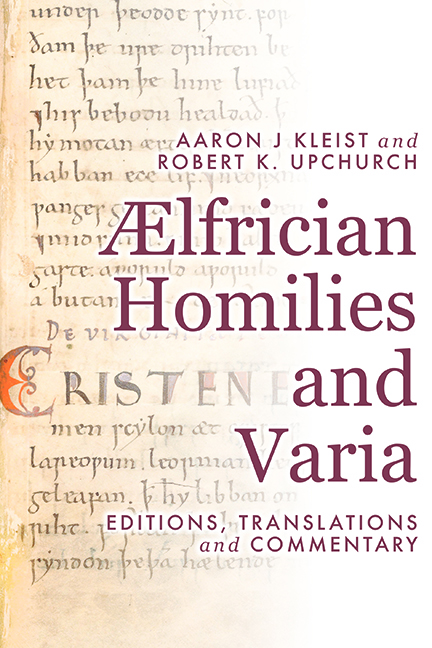Book contents
- Frontmatter
- Contents
- Preface
- Acknowledgements
- Abbreviations
- Sigla for Cited Ælfrician Manuscripts
- Dates for Cited Ælfrician Works
- Editorial Conventions
- Conventions Used in the Commentaries
- Homilies The Proper of the Season
- Homilies The Proper of the Saints
- Ælfrician Homilies and Varia: Editions, Translations, and Commentary: Volume II
- Homilies The Common of the Saints
- Homilies Unspecified Occasions
- Varia
- Works Cited
- Index
- ANGLO-SAXON TEXTS
11 - Esto consentiens aduersario (‘Be in Agreement with Your Adversary’ [Matthew 5.25])
Published online by Cambridge University Press: 05 March 2024
- Frontmatter
- Contents
- Preface
- Acknowledgements
- Abbreviations
- Sigla for Cited Ælfrician Manuscripts
- Dates for Cited Ælfrician Works
- Editorial Conventions
- Conventions Used in the Commentaries
- Homilies The Proper of the Season
- Homilies The Proper of the Saints
- Ælfrician Homilies and Varia: Editions, Translations, and Commentary: Volume II
- Homilies The Common of the Saints
- Homilies Unspecified Occasions
- Varia
- Works Cited
- Index
- ANGLO-SAXON TEXTS
Summary
Esto consentiens aduersario (‘Be in Agreement with Your Adversary’) belongs to a group of a dozen sermons Ælfric wrote for unspecified occasions throughout his career. To be delivered ‘whenever you wish’, this quando uolueris homily and the four others edited hereafter [AH II.12–15] are late works composed between ca 1005–10, and all are characterized by Ælfric's reuse of earlier material. Esto consentiens aduersario reuses a continuous passage from the letter Ælfric wrote ca 1005–6 to Wulfgeat, a layman residing at Ylmandune (Ilmington, Warwickshire) some fifty miles or so from Eynsham where Ælfric was abbot (ca 1002 × 1005 – ca 1010). Somewhat later it seems, probably between 1006 and 1010, Ælfric excerpts the Letter to create Esto consentiens aduersario. He ignores the missive's opening discussion of fundamental creedal issues and lifts wholesale the lengthy, self-contained exposition of two verses from the Sermon on the Mount wherein Jesus advises his disciples to be reconciled with an adversary on the road to court lest the judge throw them into prison (Matthew 5.25–6). To transform the excerpt into a standalone homily, Ælfric needed only to add a brief introduction to the historical context of the passage [lines 2–9] and a Latin formula to introduce the scriptural text [line 10]. The result is an exegetical eschatological homily whose interpretation and application of Jesus’ advice are bookended by reminders [lines 22–40 and 217–33] that it is the duty of teachers to teach if laymen are to earn everlasting life by turning doctrine into deeds.
The body of Esto consentiens aduersario consists of two sections of interpretation and application that focus, respectively, on disobedience and obedience. The application in both sections turns on figurative interpretations derived from Augustine's De sermone Domini in monte, a commentary whose first book explicates Jesus’ Sermon on the Mount (Matthew 5.1–7.29), but Ælfric handles the material with a freedom characteristic of his later work. In the first section, he interprets the ‘adversary’ as the devil and as the Word of God, both of which oppose believers, the former for their damnation and the latter for their salvation [lines 41–57].
- Type
- Chapter
- Information
- Ælfrician Homilies and VariaEditions, Translations, and Commentary, pp. 585 - 628Publisher: Boydell & BrewerPrint publication year: 2022



